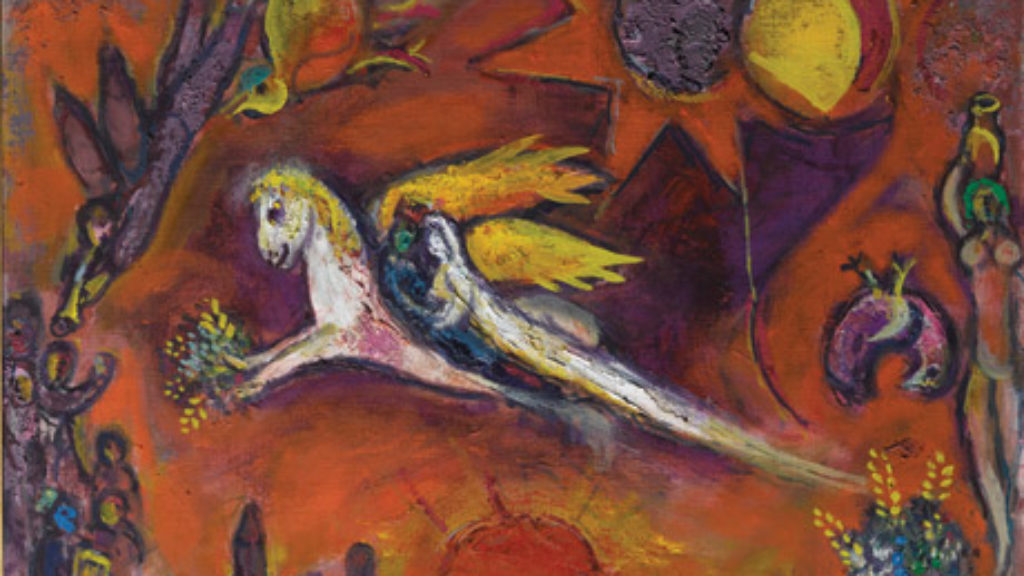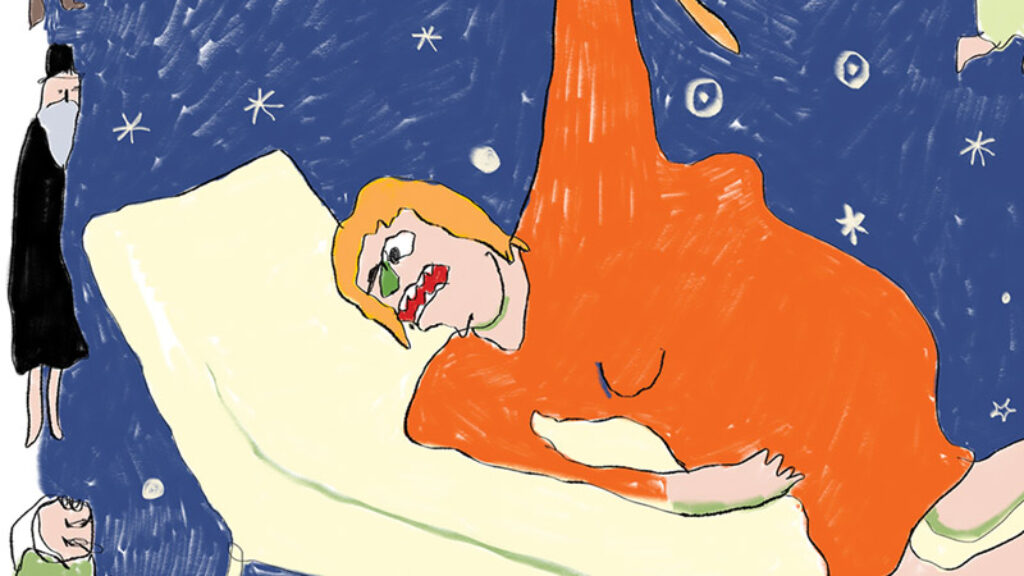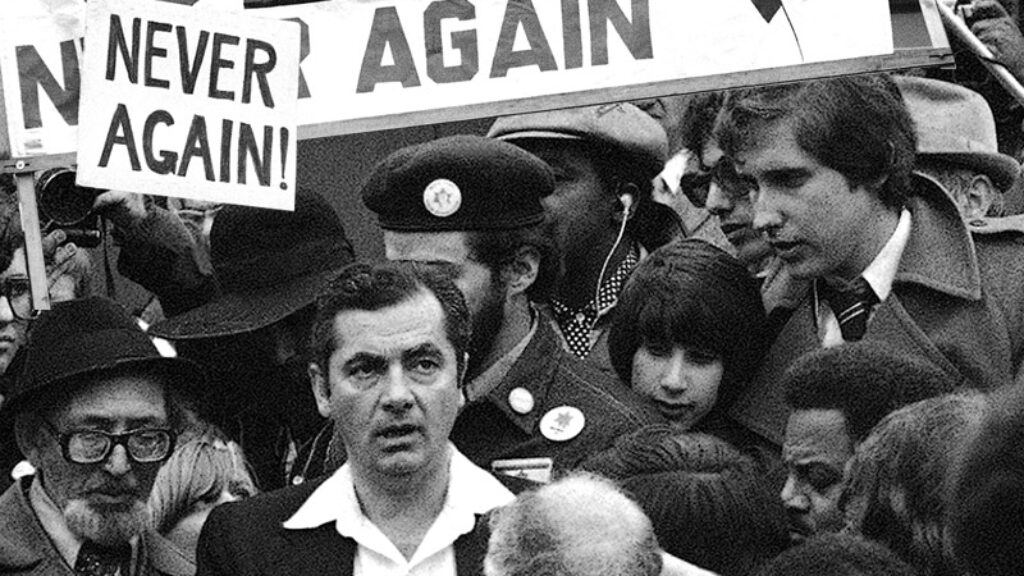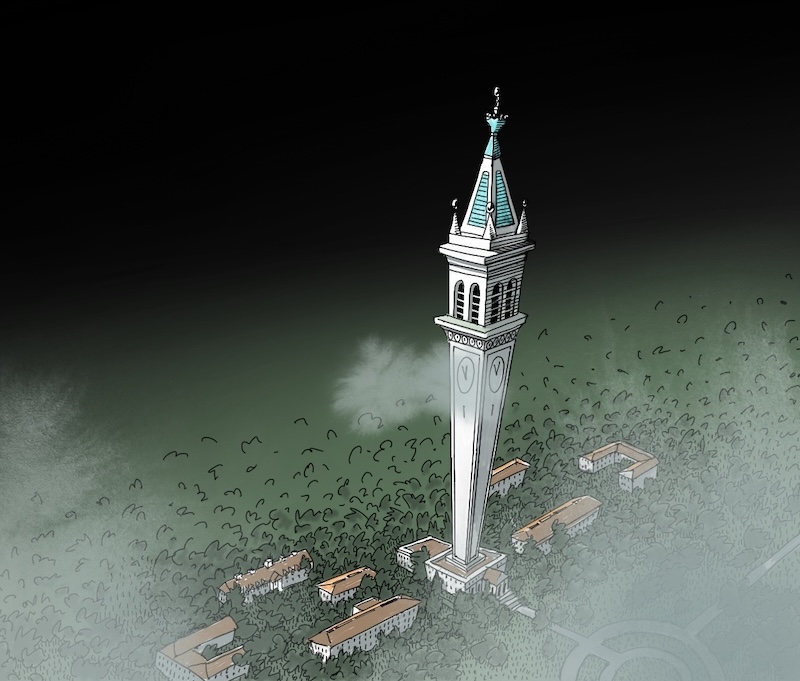Pogroms, Politics, and the Association for Jewish Studies
At 2:59 p.m. on Monday, October 9, a statement from the Executive Committee of the Association of Jewish Studies (AJS)—the main professional society of Jewish studies in North America—arrived in my inbox. Of course, I had not been looking at my watch all day and asking, anxiously, when will AJS get around to releasing a statement? Like most Jewish Americans, I had other things on my mind. But I was nonetheless pleased—if one can use such a word—that the AJS, of which I have been a member for over twenty years, had spoken out about what we already knew, well before Monday afternoon, was the worst massacre to befall the Jewish people since the Holocaust.
I should say, I was almost one hundred percent sure that the statement was about that. The heading of the email read simply, “Statement from the AJS Executive Committee.” The president of George Washington University, where I teach, had put out a statement earlier that day that danced around the murder, rape, pillaging, abduction, and desecration of more than a thousand Israelis (including several Arab citizens of Israel) and dozens of foreign nationals. It did, however, stipulate in its title line that it was “Addressing the War in Israel and Gaza.” Something seemed a trifle off about a heading that was so vague and skeletal. Still, I reasoned, an AJS statement published two days after October 7, 2023—a date that David Remnick of the New Yorker wrote will be “etched in Jewish history”—had to be condemning, and conveying extreme shock and grief at the mass slaughter of Jews by Hamas terrorists (or militants, whatever you like). I suspected that it might also—rightly—deplore attempts to lump all Palestinians wherever they live with Hamas and call for every measure to be taken to avoid killing innocent civilians in Gaza. Maybe the heading was simply written in haste, I thought. I put an asterisk on the email to make sure I read it, after I had opened and responded to a few messages from friends, colleagues, and an editor first.
When I did open the AJS email, I found that something was more than a trifle off. Considerably more. The statement was about the events of the previous weekend, but the email’s content-free subject line turned out to be symptomatic of the statement that followed. “The members of the AJS Executive Committee,” it said, “express deep sorrow for the loss of life and destruction caused by the horrific violence in Israel over the weekend. We send comfort to our members there and our members with families and friends in the region who are suffering. We offer support during these dark times.”
Only the word horrific seemed apt; the rest of the statement managed the rare feat of being both drab and discordant. Deep sorrow sounds like something a congregation would express about the passing of an elderly and beloved member. “It is with deep sorrow that we announce the death on [enter date] of [enter name], beloved spouse of [enter name], parent of [enter names], grandparent of [enter names], maybe great-grandparent of [enter names]. May their memory be a blessing.” But that particular phrase, however pallid, was at least palatable; the rest of the first sentence (there were only three sentences) was not. The “deep sorrow” was for “the loss of life and destruction caused by the horrific violence in Israel over the weekend.” Mistakes, as they say, were made. It was “violence” that had meted out death and destruction throughout southern Israel, not over a thousand Hamas terrorists. Scholars who know (or pretend to know) their Marx and Lukács and who in any other instance would rail against reification somehow wrote a sentence ascribing agency to “violence.” And whom did “violence,” that Angel of Death, victimize? Apparently no one specifically. In a statement by the Association of Jewish Studies, Jews were nowhere to be found.
Shortly after reading this statement—and rereading it to make sure that I really had just read what I had just read—I cut and pasted it onto my Facebook page and wrote the following:
That we have come to the point where the Association for Jewish Studies (!) cannot even mention the word “Jews” in an email like this . . . but has to resort to such anodyne language (“the loss of life caused by the horrific violence in Israel over the weekend”), is truly mind-boggling to me, and frankly shameful.
My post garnered a number of responses, mostly supportive, though a few defensive. A current AJS board member, while genuinely curious about how I would have worded the statement, explained to me that “the AJS is a learned society that is devoted only to the study of Jews and Judaism—and is otherwise neutral and non-partisan.” That is a commendable position that I would generally endorse. We frankly have too many political statements being issued by professional societies today that are neither directly related to their mission nor reflective of the diversity of views held by their members. If the AJS had a clear policy of always remaining “neutral and non-partisan” and on that basis declined to say anything about that weekend’s atrocities, such a principled reticence would have struck me in this case as rigid and extreme but, at the very least, consistent.
As it turns out, AJS has waded previously into political waters. Just last year, after Russia invaded Ukraine, the AJS without mincing words condemned the Russian invasion of Ukraine. In August 2019, then-president of the AJS Christine Hayes announced in an email to all members that the Executive Committee had voted to cosign a “strong statement” written by another learned society “decrying white nationalism and the misuse of history in service of divisive and destructive ideologies.” That the AJS did not deem it similarly necessary to release a “strong statement” in response to—let us call it what it is—a pogrom against Jews carried out by Islamist radicals committed to the destruction of the State of Israel is, if I can make a mild statement, perverse.
In another response to my post, Lila Corwin Berman, a professor at Temple University who is a member of the Executive Committee and one of the leading scholars in the field of American Jewish history, wrote that she had helped draft the statement. She made clear that she personally condemned Hamas’s actions and expressed sympathy for my concerns. I appreciated her candor as well as her openness to criticism. In what I guess was an attempt to explain why the statement was so wan, she wrote, “AJS . . . is an organization that does not wield state power or engage in statecraft.” I appreciated her setting me straight on that, though such considerations hadn’t prevented countless other nongovernmental organizations from releasing statements, some quite good, some really bad, some a bit of both. Nor had it dissuaded AJS from making “strong statements” in the past when it deemed them warranted.
Thinking about Professor Corwin Berman’s explanation, I went back to my inbox and searched for other messages from the AJS. Of course, most were about conferences and other professional matters, but then I ran across this email from June 2020 with the justly dramatic headline “We Cannot Remain Silent”:
The Association for Jewish Studies voices support for the national protests demanding justice in response to George Floyd’s senseless brutal death while in police custody and calling for legal reforms to address the long and painful history of anti-Black racism and violence.
As scholars of Jewish history and culture, we understand the acute suffering and disastrous impact of the unwarranted, excessive and often illegal use of force against minority civilian groups by law enforcement agents. We reject the efforts by some national leaders who have sought to deflect responsibility through false equivalencies and further incitement to violence.
We reaffirm our commitment to the values of diversity, equity, and human rights. We call on our colleagues to channel our personal outrage in the application of our professional research, scholarship, practice, and teaching to participate in overturning the deeply entrenched institutional sources of race-based inequality that are barriers to a more just and equitable world. We must do better and we can do so together.
Although I might have argued to frame it somewhat differently, this was a statement with which I wholly agreed. And yet, one would have thought that if the study of Jewish history and culture provided unique insight into the suffering of non-Jews, as this statement argued, it would be of some use in describing and condemning the mass slaughter of Jews. The frank outrage expressed in the statement after George Floyd’s murder was entirely absent from the current AJS statement.
Oddly, the fact that AJS was not a sovereign entity, and hence could not engage in forthright condemnation or even description of senseless murder, only emerged as an issue when Israel was concerned.
On Tuesday afternoon, as Harvard and other major universities were scrambling to revise their own exquisitely obtuse milquetoast statements, AJS did likewise.
Reading the updated statement was something like sitting in one of the back rows of a big lecture hall when, as a result of a sudden lurch in the microphone volume, the speaker’s voice goes from inaudible to earsplitting before moderating. Strong action verbs replaced the passive and passionless originals. The Executive Committee now “unequivocally condemn[ed] Hamas for killing and kidnapping hundreds in Israel, targeting civilians, and perpetrating horrific atrocities.” Adding a tablespoon of emotion, they now exclaimed that they were “shocked and devastated by these awful events.” There was newfound resolve and solidarity: “We stand with our members who are in Israel as these traumatic events unfold and pray for everyone’s safety and security.” That’s more like it, I thought. But on a second reading, I noticed something—or rather its absence. There was now an agent—Hamas—and specific actions, but there wasn’t exactly an object. Civilians were targeted in Israel, but what sort of civilians? We know that tourists, Thai workers, and Arabs were murdered, maimed, raped, and kidnapped along with the Jewish residents of the towns, kibbutzim, and moshav on the Gaza border. But we also know that the aim of Hamas was to kill, torture, and terrorize Jews. Indeed, they have gloried in precisely that in their social media posts about the attack, and, after all, it is infamously called for in their chartering document.
Why did the half-dozen distinguished scholars who form the Executive Committee of the Association of Jewish Studies first feel obligated to obfuscate about the terrible events to which they were ostensibly responding and then, even after resolving to speak more frankly, still find it hard to speak of Jews? After all, they (we) are, in one way or another, the subject of their academic life work. I wasn’t in the room, but I have a guess, and so, I bet, do you.
We live in a moment of performative politics and institutional failure. Professor Corwin Berman had written to me that AJS did not engage in statecraft, but these statements were certainly a matter of public diplomacy, which is to say politics. Just as Harvard was catering largely to one set of constituents in its first statement and a second set of constituents in its revision, so, too, the AJS. No crucial new information was learned between statements. In both cases, a second committee meeting had to be hastily called to hammer out new, stronger language in response to outraged emails from constituents who needed placating.
George Orwell famously wrote that political language consisted “largely of euphemism, question-begging, and sheer cloudy vagueness,” and that certainly describes the AJS’s first statement. It may also hold a clue to the reason a group of eminent Jewish studies scholars refrained from saying that it was Jews who were being massacred.
In recent years, AJS, which had been largely apolitical, took a sharp political turn. Many other learned societies, with their myriad failed and successful BDS resolutions, took the turn first. And between Donald Trump, the Muslim ban, #metoo, Charlottesville, Pittsburgh, a global pandemic, George Floyd, January 6, and the Russian invasion of Ukraine, some degree of politicization was probably inevitable. But the extent to which the AJS as an organization embraced a progressive and activist agenda was profound. The shift was especially pronounced in the association’s biannual magazine Perspectives. From 2019 to 2022, when Mira Sucharov of Carleton University and Chaya Halberstam of King’s University College served as coeditors, four of the eight issues were titled “The Patriarchy Issue” (Spring 2019), “The Hate Issue” (Spring 2020), “The Protest Issue” (Spring 2021), and “The Justice Issue” (Fall 2022). One notices a trend.
In “The Hate Issue,” amid all the articles (some of them excellent) on white nationalism, the Westboro Baptist Church, the blood libel, the treatment of Ethiopian Jews in Israel, Jewish self-hatred, and even the Kabbalah, only one author, David Schraub, briefly (though brilliantly) dissected antisemitism on the left. Antisemitism among Muslims received glancing mention; antisemitism among American minority groups was ignored entirely.
“The Justice Issue” left a particularly sour taste in the mouths of many members of the AJS. Its most controversial piece was a short profile of Gaza Ghetto, an activist art project that Ruth Sergel created after the war against Hamas in Gaza (Operation Protective Edge) in the summer of 2014. Sergel inks the name and age of every Palestinian killed in Gaza on her forearm, takes a photograph, and then uploads it to social media. To evoke the indelible arm tattoos of Auschwitz with a kind of write-it-on, wash-it-off body art linking Palestinians to Holocaust victims (and the Israelis, by implication, to you-know-who) is as historically and politically ignorant as it is morally abhorrent. Whether Gaza fits some sociological definition of a ghetto, it is not the Warsaw Ghetto; nor, to state the obvious, is it Auschwitz, and one might have expected the magazine by and for scholars of Jewish history and culture to at least note this.
Instead, the editorial copy that accompanied the photo essay quotes Sergel as saying that one must “risk . . . transforming our imagination into substantive action in the physical world,” adding, “This is the task of both artists and Jews; to make difficult statements of conscience in the face of extreme political climates of any kind” (italics mine). Scholars of Jewish studies are rarely artists and not necessarily Jews, so perhaps this obligation to make difficult statements without regard to political climate does not apply to them (us). Still, one would have hoped that, in a moment when the dead of southern Israel were still being counted and new atrocities against them being discovered, the Association of Jewish Studies would have applied its self-proclaimed deep historical understanding of “acute suffering” to contemporary Jews.
In art editor Douglas Rosenberg’s introduction to “The Justice Issue,” he describes attending a Black Lives Matter protest in Madison, Wisconsin, in the summer of 2020 and the pride he felt when he saw that his congregational rabbi was at the center of the assembled clergy. “I found myself gesturing to him so as to say, thank you for representing us, the Jews who believe in justice for ALL people, especially for those people who are not Jews.” Especially.
After the AJS issued its revised statement, a colleague in Jewish studies uploaded it to his Facebook page and wrote:
Leading our organization is an unpaid and often thankless job, thankless when things go right but vocally criticized when they don’t. I wish we could give them more credit for trying their best under difficult circumstances rather than assumption of malintent.
I wish that I could agree, but what changed in the twenty-four hours between the AJS’s first statement and its second was that an apparent political squeamishness on the part of some of its leadership about describing and condemning the savage massacre of Jewish civilians by the Islamist terrorists of Hamas—a reductio ad absurdum of certain kinds of campus piety and political timidity—became untenable. The AJS is a great scholarly institution, but it is one that needs a course correction. This may well be a thankless task, but I, for one, will give those who undertake it all the credit they are due.
Comments
You must log in to comment Log In
Suggested Reading

I Have Come to My Garden
Without the Torah, says Rabbi Akiva, we would still be able to discover all its truths by delving deeply into the words of the Song of Songs.
I’m Still Here
Tuvia Reubner has said he has no homeland except perhaps his poetry. A new book expands that homeland's borders.

Nobody’s Fool
After Saul Bellow translated "Gimpel the Fool," he, Irving Howe, and Lazer Greenberg had a lechaim over schnapps. But nobody talked with Isaac Bashevis Singer.

Are We all Kahanists Now?
Shaul Magid attempts to show us how much contemporary Jews have inherited from a man most have tried to forget.

Kelly McGrew
The fallacy which modern liberals and progressives perpetuate is that 'diversity' is a desirable objective. What is unspoken is that those advocates of diversity do not desire blanket diversity, but rather a selective diversity. Blanket diversity includes the acceptance of both 'pro-life' and 'pro-choice'; Hamas/Hezbollah/ISIS and Islamophobia; Chinese ethnocentric xenophobia and nationalist patriotism; Neo-Nazis and other white supremacists as well as the anti-racism racism.
The diversity the modern liberals and progressives want is a diversity that includes ONLY those opinions and behaviors of which they approve: all others are exiled.
Hamas is not a liberation movement seeking to empower and liberate the Palestinian people. Were it so, they would have developed adequate sources of potable water; sewage, waste, and storm water treatment systems; power generation and distribution infrastructure; education and health services for the Palestinian people in Gaza. They would have provided the environment for the rich minds of Palestinians to create innovations to improve the world while providing a return on investment. Hamas would have created an environment to provide employment to those willing and able to work.
Instead, they spend hundreds of millions of dollars--if not billions--on tunnels; arms; command and control systems; propaganda; and undoubtedly some found its way to numbered bank accounts in offshore accounts.
Hamas is not #HamasIsISIS; Hamas is Arab Nazism. ISIS kidnapped Yazidi women to take as brides; Hamas kidnapped Jewish women to use as sexual objects and then murder them. Hamas/Hezbollah/Iran, their supporters, and their sympathizers are of the worst kind of evil the world has seen.
The position of the AJS Executive Committee over the several examples given by the author clearly demonstrates that while they may not be intrinsically evil, they are not on the side of good.
Richard Genirberg
I read Prof. Schwartz's passionate and inspiring article just minutes after reading a bloodless and anodyne university response addressed to alumni from my alma mater about the recent horrific attack against Jews. I was not surprised or annoyed that Stanford President Richard Saller and Provost Jenny Martinez also omitted the Jewishness of the targeted victims, characterizing the organized violent pogrom as a "Hamas attack in Israel," but such an omission by a group calling itself the Executive Committee of the Association of Jewish Studies (AJS) is unconscionable. That the author characterized this association as the main professional society of Jewish studies in North America reinforces my disinterest in, and mistrust of, academic Jewish associations. I'll continue to prefer to associate personally with Jewish groups that daven Ma'ariv after political discussions. However, I'm pleased to learn that there are explicitly Jewish supporting academics such as the author. I rely on this publication almost exclusively to acquaint me with the writing of such interesting scholars and praiseworthy individuals.
Fredric Brandfon
Reading about the AJS's (I am a member) written responses to the October 7 pogrom I was reminded of Pope Pius XII's 1942 Christmas address wherein he said ""hundreds of thousands of people who, through no fault of their own and solely because of their nation or their race, have been condemned to death or progressive extinction." The Pope was then, and is today, castigated for condemning the crime, but failing to condemn or even mention the perpetrators of the crime, the Nazis, and for failing to identify the victims as Jews. That the AJS has followed so closely in Pius XII's footsteps is dismaying. Eighty years later with Pius XII's wartime archives now open we are beginning to understand his tepid response. See David Kertzer's The Pope at War, and my book Intimate Strangers, A History of Jews and Catholics in the City of Rome. Hopefully with your article an understanding of the AJS's response will not take as long.
JJ Gross
Precisely which planet is Mr. Schwartz on? The AJS has long since ceased to be merely non partisan. It is riddled with members who are unabashedly hostile to Israel and intersectionally embedded with everything that is wrong with American academia. And even if a timid majority has not yet descended that low, its meekness and reluctance to speak up about the growing hostility within its ranks speaks volumes about the lack of backbone that virtually defines this club of Jew-ish milquetoasts